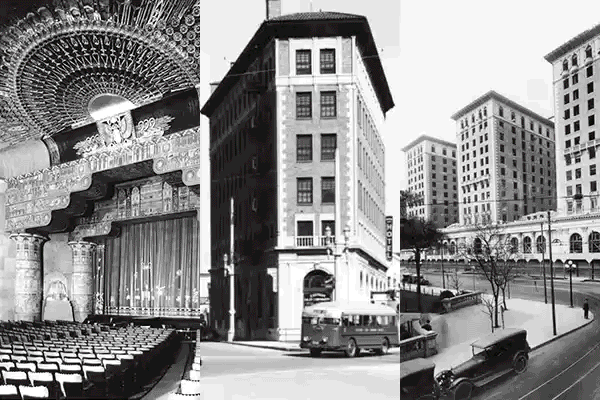Shining farewell to Tinseltown’s mayor
The brass star on the terrazzo sidewalk was perfectly polished. The crowd of onlookers included fans young and old. The ceremony started right on time.
Johnny Grant would have approved.
The man who presided over thousands of presentations and awards on Hollywood Boulevard was the center of attention for a final time Thursday as community leaders and movie fans praised his role in helping to rejuvenate the town’s image.
Grant, who for decades was known as Hollywood’s honorary mayor, died Wednesday in his penthouse suite atop the boulevard’s Hollywood Roosevelt Hotel. He was 84.
“He was the bridge between Hollywood’s golden past and what’s happening today,” Hollywood Chamber of Commerce President Leron Gubler told the crowd gathered to place flowers around Grant’s star in front of the Kodak Theatre, a symbol of the community’s revitalization. “Johnny was perhaps the greatest cheerleader Hollywood ever had, even in its darkest days.”
Indeed, Grant remained a faithful and unrelenting booster for Tinseltown even during the decades when the once-famed boulevard was mired in crime, blight, boarded-up storefronts and subway construction that damaged many of his beloved sidewalk stars.
Hollywood finally began turning around about a decade ago -- suddenly becoming hip again in ways Grant could only imagine. An explosion of trendy nightclubs drew new generations of young people into Hollywood, including young starlets and the paparazzi who follow them.
Grant, who came to Hollywood during its silver screen glory days, didn’t have much in common with some of the new Hollywood denizens -- but he embraced them nonetheless.
Elizabeth Peterson, who has opened several nightclubs and bars in Hollywood over the last decade, said she had the wrong impression of Grant when she met him in the late 1990s.
“I thought he was sweet and lovely but he was caught in a time capsule,” she said. “I was wrong.”
Instead, Peterson found Grant to be an agent of change -- someone who looked past the blight to see a vision of Hollywood as a prime entertainment destination.
And Grant endeared himself so much to her she didn’t mind his nickname for her -- “Legs.”
“He always thought I had great legs,” Peterson said. “Without him, people like myself could not redevelop. He held everything together in such a positive light.”
Friends and civic officials placed flowers on Walk of Fame stars bearing Grant’s name and on his concrete footprints that are enshrined with those of other Hollywood luminaries in the forecourt of Grauman’s Chinese Theatre.
They remembered him as the always ebullient Hollywood booster, even when the place seemed to be fading into a seedy shadow of its glory days. They thanked him for turning into a real-life link between the area’s glamorous past and its emerging reputation as a glittery, edgy entertainment center.
Onlookers listened somberly as condolences sent by Nancy Reagan and Jackie Autry, widow of actor and Hollywood broadcaster Gene Autry, were read.
Los Angeles City Council President Eric Garcetti, who represents a portion of Hollywood, credited Grant with helping usher in “our second golden age.”
“Johnny believed in Hollywood more than any of us. There are thousands of stars on the Hollywood Walk of Fame, but none shines brighter than Johnny’s,” Garcetti said.
Grant’s friends said his death was unexpected. Although he had recently been treated for a back fracture, he seemed to be improving.
Ana Martinez-Holler, a Chamber of Commerce staff member who worked for two decades with Grant, said she had met him for lunch Wednesday at the Hollywood Roosevelt Hotel. “He said he wasn’t feeling good,” she recalled.
When he failed to answer several telephone calls later in the afternoon, Martinez-Holler asked Chamber of Commerce photographer Bob Freeman to look in on him.
“When I knocked on his door I thought he would open it and chew me out for being concerned,” Freeman said. When Grant failed to come to the door Freeman entered the apartment and found him motionless in his favorite rocking chair. Firefighters tried to revive him but failed.
He had lived since 1991 in the 14th-floor penthouse, which was lined with photos of him and film stars and mementos such as one of Gene Autry’s saddles and Ronald Reagan’s uniform from “Brother Rat.”
He often whiled away time by listening to a police and fire department scanner. When he heard nearby emergency calls, he could walk out on a patio to watch the action.
Grant remained atop the hotel even after a major face-lift that made the Roosevelt one of the city’s trendiest spots -- even if he sometimes looked out of place amid the starlets and beautiful people.
“He had a contagious personality,” said Bailey Reed, a hostess at the hotel’s restaurant where Grant had breakfast each morning.
“He knew everyone and had nicknames for everybody,” said Naomi Stroud, a former waitress at the hotel.
To Peterson, the nightclub developer, the Roosevelt’s reemergence as a hot spot was a metaphor for Grant.
“He was Hollywood’s Roosevelt Hotel,” she said. “He was timeless and moved through the periods. He was very proud of the redevelopment. None of it would have happened without him.”
Those at Thursday’s ceremony said Grant’s demeanor was constant, even when he mingled with Hollywood’s biggest names.
“He was always just a cute little cherub,” said Jim Harper, a retired accountant and talent agent now living in Anza, Calif., who met Grant in 1946. “He never changed. He just added weight.”
Nick Ut, an Associated Press photographer who met Grant when he brought a troupe of entertainers to South Vietnam for a USO show in the 1960s, said he was glad to oblige when the wire service asked him to linger Thursday on Hollywood Boulevard and shoot extra pictures of tourists pausing at Grant’s star.
“I was happy to. I loved him,” said Ut, who won a Pulitzer Prize for his Vietnam war photography.
Erika Melanson, a 19-year-old San Diego resident, and Ian Datz, 21, of Hollywood, stopped to admire Grant’s flowers.
Melanson said she appreciated that Grant kept the glamour of old Hollywood alive. “Tradition is important,” she said.
Datz said he appreciated Grant’s role in turning Hollywood around. “The Hollywood scene that is here now is the reason I moved here,” he explained.
Thursday’s Walk of Fame proceedings ended on schedule. The remarks that were delivered were heartfelt -- and short.
Johnny Grant would have approved of that, too.
--
Times staff writer David Pierson contributed to this report.



